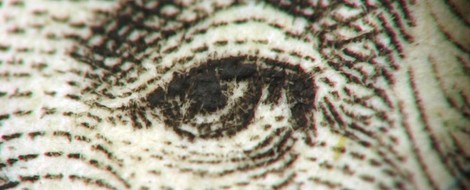Your podcast discovery platform
Curious minds select the most fascinating podcasts from around the world. Discover hand-piqd audio recommendations on your favorite topics.

piqer for: Global finds Technology and society Globalization and politics
Elvia Wilk is a writer and editor living in New York and Berlin, covering art, architecture, urbanism, and technology. She contributes to publications like Frieze, Artforum, e-flux, die Zeit, the Architectural Review, and Metropolis. She's currently a contributing editor at e-flux Journal and Rhizome.
What Do We Have Without Cash? A Society Of Banks
“If we are going to refer to bank payments as ‘cashless’, we should then refer to cash payments as ‘bankless’. Because that’s what cash is, and right now it is the only thing standing between us and a completely privatised money system.”
In a canny and entertaining article for Aeon, Brett Scott writes about what’s really at stake with the potential coming of the “cashless society” that several economists have been preaching.
Scott likens cash to a “public utility” that is “in principle open-access”, whereas banks’ “digital fiat money” is not only entirely virtual but “essentially private”. Therefore a cashless society would be, wait for it: a society of banks.
No surprise, then, that banks are one-third of the “elite groups” waging war against cash. The other two players are private payment companies—credit cards, PayPal—and the third is the State. That’s because if all payments are digital, all transactions are trackable and ostensibly controllable. A government seeking panopticon-like power through public–private partnership couldn’t find a better place to start.
This leads to the fear-mongering “cash is used by criminals” tagline that governments often wave around—but then, Scott argues, “crime just goes digital” if there’s no wallet-stealing option left. Rather than clearing out the societal underbrush of pickpocketing thugs and drug dealers:
“Under the guise of destroying the ‘shadow economy’, the underclass, the unwatched, the eccentric and the untamed will be coercively corralled into the hands of the state–corporate mainstream.”
A cashless society would depend entirely on a system of “gatekeepers” who get to decide when business isn’t allowed. If a vending machine or a credit card company arbitrarily (or pointedly) decided to block you from making or accepting a payment—you just wouldn't have any purchasing power without cash. As Scott puts it, do you really want to live in that kind of world without being able to buy drugs?

This is one of the creepiest ideas floating around these days and it perfectly falls in line with the fight against encryption. The pressure to conform in a society, that is tracing every step, every line of digital communication and even the tiniest transaction, is an outright nightmare - and it's insane how close we are in living in it.
good piq! it's great - and necessary - that journalists try to translate this discussion into the public. i can hardly bare that people - including journalists - accept that a privately owned companies provide the backbone to what everybody now calls a "social networks". but it would be the culmination of our kleptocracy if we were forced to use virtual money.
i completely agree with frederik: creepy (below).
nice text, and I especially endorse the fear of even more intensive state surveillance, but the sharp distinction between cash and bank credits is unaproppriate. currency - central banks liability - does indeed stand higher in the pyramide of money than deposits - the private banks liability - which becomes clear by observing that the 07/08 bust in asset values didn't cause deflation of currencies. Without the ability to issue (or eliminate) currency, central banks would extend guarantees on deposit and strengthen their role as lenders of last resort in cases of market stress. Yet, theorectically, all nations would have to abandon their currencies at once in order to extinct cash use (you could simply switch to a foreign currency). Plus, bitcoins show that currencies needn't be issued by states OR commercial banks: throughout history, alternative currencies hardly controllable by the state have been upsurging when needed. Bitcoins, by the way, is, I suppose wihtout knowing it, THE currency of crime, rather than cash. This might give us drug-users and dystopians some hope ;)